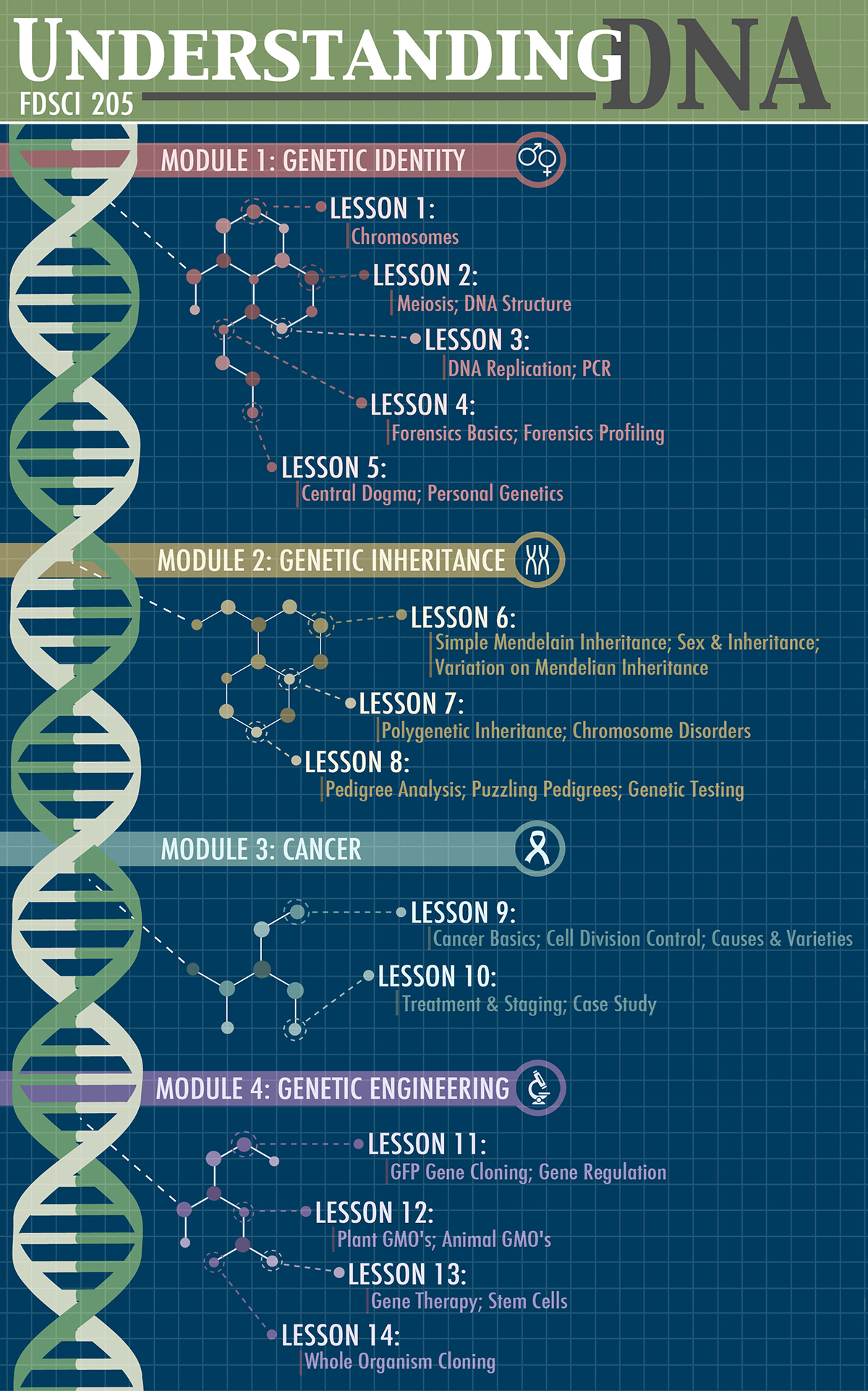Syllabus
Course Description
The structure of DNA stands as one of the greatest discoveries of the 20th century and has led to multi-billion dollar advancements in medicine and agriculture. An understanding of DNA and its applications is necessary to distinguish fact from fiction, make informed decisions, and take full advantage of emerging DNA technologies. This course presents the fundamental concepts related to DNA including its history, structure, function, regulation, and inheritance. The remaining course material explores multiple issues and topics that are founded in DNA technology. These include the causes and treatments associated with genetic disorders and cancer, the creation of genetically modified foods, identification through DNA fingerprinting, tracing of family lineages, the applications and ethics of cloning and stem cell technology, and the underlying mechanism of organic evolution. Course methods include lecture, discussion, and hands-on exercises related to the subject material.
Prerequisites
FDSCI 101, FDENG 101, Foundations Math Requirement.
Course Outcomes
- Identify the role of DNA in humans and its application in modern Biotechnology issues.
- Explain DNA’s role in the complexity of life processes, the variation among God’s children, and the uniqueness of the individual.
- Articulate opposing views on scientific issues and show how evidence supports or refutes a conclusion.
- Integrate gospel perspectives with science in evaluating biological issues.
- Find and evaluate scientific resources.
- Become informed and involved citizens.
Text
Genetics 101, Michael Windelspecht, 2007, ISBN 978-0-313-33391-1This text is available free online. Your BYU-I username and password are required.
Recommended Browser
Mozilla Firefox is the recommended browser for use with I-Learn. However, you must use a recent version to see all FDSCI 205 content. If you have questions about your browser please contact the BYU-I Help Desk by email: helpdesk@byui.edu, or phone: 1-866-237-5195.
FDSCI 205 includes many embedded tutorials and animations. You must enable your browser to display blocked (or insecure) content. Watch the video (embedded below) to learn why and how to do this.
NOTE: If you see a blank page in this course or a blank area on a I-Learn page, you probably have not enabled insecure content. All the content in this course is safe to display. You will not harm your computer by enabling insecure content.
Tutorial Title: Tip: How to View Insecure Content (Browser Security)
URL: http://www.youtube.com/watch?v=XCOP5asLr9g
Estimate: 4:12 min
Description: This video explains how and why to allow your browser to display blocked (or insecure) content.
Author: Brad Marshall, Applications System Engineer BYUI
Expectations
This is a 3 credit course; therefore, you are expected to work 9 hours/week (on average). Some weeks, you will work more than 9 hours/week and some weeks you will work less.
Due Dates
See Calendar for due dates.
Late Work
Late work is not accepted. However, your Instructor may extend the deadline if you experience extenuating circumstances. Contact your Instructor to discuss personal or emergency situations.
Grading
FDSCI 205 uses the point system. There are approximately 530 points available in this course.
Preparation/Participation = 60 points possible
Exams = 300 points possible
Quizzes = 70 points possible
Homework/Assignments = 100 points possible
Grading Scale
A = 93–100%A- = 90–93%B+ = 87–90%B = 83–87%B- = 80–83%C+ = 77–83%C = 73–77%C- = 70–73%D+ = 65–70%D = 60–65%D- = 55–60%F = 55% and below
Modules
You will study four modules:
Genetic Identity: Lesson 01—Lesson 05
Genetic Inheritance: Lesson 06—Lesson 08
Cancer: Lesson 09—Lesson 10
Genetic Engineering: Lesson 11—Lesson 14
Understanding DNA Course Outline

